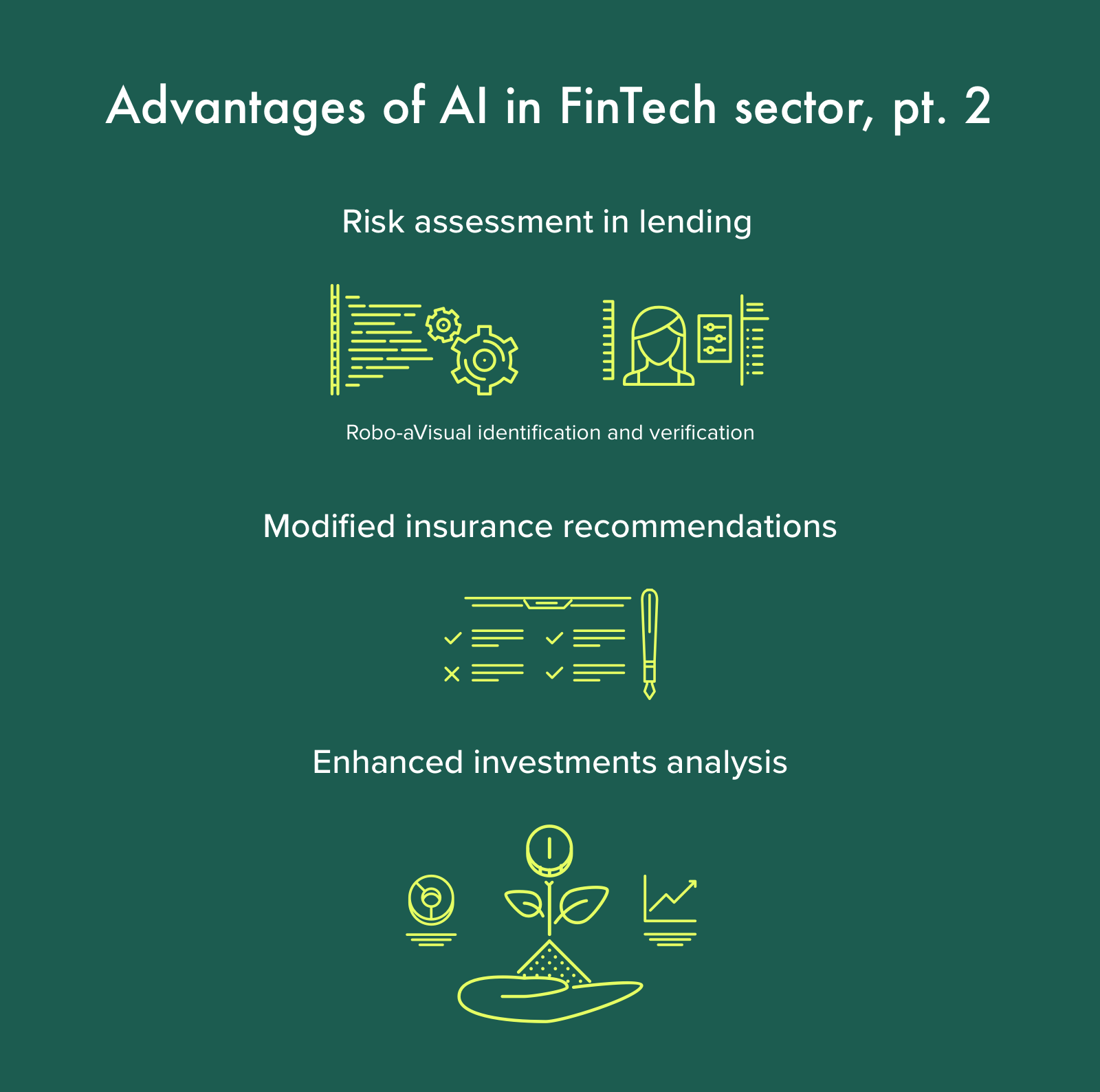How AI contributes to the finance sector: Top 5 FinTech Use Cases

Artificial intelligence became an integral part of every scope of activities. As well as any other field, FinTech has also applied IoT into its processes. AI in financial operations exists for a long time, but we don’t pay attention to it. In this article, we’ll go through the financial problems that AI can deal with.
Benefits of AI in FinTech
There’s a number of challenges in the finance sector to be solved right now. AI significantly influences this field and solves a lot of issues. Let’s get a closer look at them.


Improved Customer Experience
The communication between the customer and financial organization is usually held over the phone or online chat. The problem is that bank representatives are humans that can make mistakes and give wrong information. Their efficiency is also affected by exhaustion, mood, and overall mental condition. If an employee is tired, the conversation may annoy him, thus ruining the customer experience. AI in FinTech offers a solution to this problem.
Chatbots
Chatbots are well-known technology today and need no introduction. But what exactly can they do in FinTech?
- Notifying users about all the recent changes;
- Managing users’ accounts;
- Process users’ complaints;
- Provide consultations on the major issues;
Thus, you can build a chatbot to improve user experience and increase brand loyalty. This technology responds within seconds and doesn’t depend on the mood.
Robo-advisors
Robo-advisors is a software designed specifically for the FinTech field. This technology stands for a portfolio manager. It allows users to assess an investor’s risk tendency, choose an investment strategy, and buy stock according to the predefined rate.
These technologies will surely change the customer experience for better, but what else can AI offer to financial organizations?
Fraud Predictions
Fraud prediction is another significant benefit of AI. Based on the customer’s behavior pattern AI predicts possible frauds. For example, when a user receives an abnormal transaction, the information is passed to a fraud prevention department to investigate the case. Besides, the system can record previous fraud cases and draw conclusions based on them.
With the protection of AI, your customers will feel much safer. The safety engages the trust in your product and the involvement of new clients.


Risk Assessment in Lending
Lending stands side-by-side with fraud prediction because one AI algorithm can be applied in both of these fields. With the help of AI, banks and smaller lending organizations can analyze large volumes of data to assess the risks of giving a loan to the customer.
Visual identification
With the help of machine learning algorithms, banks can compare clients’ identities with their IDs to ensure that their identities match. Thus, lending organizations will know that the loan falls in the right hands. On top of that, AI can be used to automate the maintenance of loan documentation.
Insurance Recommendations
Insurance sector as well as financial deals with large volumes of data. As we already know, that’s the best case for AI. Algorithms can assess the damage on vehicles or properties and estimate the compensation payment without human interference.
By using Big Data, IoT, and AI, insurance companies will be able to decrease the number of to turn insurance into a preventive service, instead of a compensation service. The autonomous monitoring of clients’ housings can prevent accidents and decrease the number of insurance claims. Thus, AI is a must-have for the insurance business to make the company more efficient and improve customer experience.
Investments Analysis
Hedge funds today are interested in AI systems that can handle large data arrays and analyze the quality of investments. Some hedge funds had an unfortunate experience in automation investment processes using computing models. That’s why AI is considered to be the most suitable tool for automating so far.
In a perfect world, AI is meant to create a system that performs all stock operations without the human subject’s participation. Self-sufficient AI algorithms can make predictions about stock prices based on market analysis. Then, the software decides on the best possible option. Therefore, investors should keep an eye on AI technologies that make investing suggestions and possibly increase income.
Wrapping Up
As you can see, AI, and associated technologies, like big data and machine learning, can change the financial sector for the better. Automating FinTech processes leads to improved customer experience, increased revenue for businesses, risk reduction, and more. However, a well-built AI system is a complicated and time-consuming project. To achieve the desired result, you have to find an experienced team of developers.
Author’s bio:
Vitaly Kuprenko is a technical writer at Cleveroad. It’s a mobile and web app development company in Ukraine. He enjoys telling about tech innovations and digital ways to boost businesses.






I had a question that I couldn’t answer after studying a lot of information about the cryptocurrency industry and realizing that I was ready to make money from it: “Kraken or Coinbase Pro?” At the time, these were the two most well-known trading exchanges, and I couldn’t decide which one to use. I also looked at a variety of comparisons, such as “Kraken versus Coinbase.” Both platforms have been on the market for a long time, are among the most prominent crypto exchanges in the world, provide functionality for both novices and specialists, and enable clients to purchase cryptocurrency using a credit card. Kraken and Coinbase Pro are ideal for traders seeking excellent liquidity and a diverse range of products
Have you heard that El Salvador has adopted bitcoin yet, also there were a meeting with CZ from Binance and that’s a huge collab!And Europeans are also preparing to take that step of adopting cryptocurrencies. So maybe bitcoin in the czech republic will be adopted in a few months.